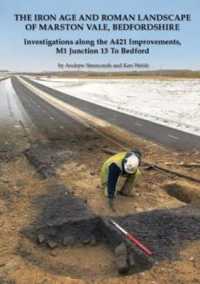- ホーム
- > 洋書
- > 英文書
- > Politics / International Relations
基本説明
A profound critique of both the New Labour project and its role in the war in Iraq.
Full Description
Britain's participation in the Iraq war defines one of the most tumultuous periods in its political history. Driven by a desire to enhance the influence of the British government on the world stage, the decision to support the US-led invasion has severely disrupted the stability of international relations, produced rising disenchantment with the domestic political process, and has threatened to undermine the continued viability of the New Labour project. Yet these developments are also indicative of a far-deeper malaise. The events surrounding the war have clearly exposed the flaws and weaknesses that are inherent within the British democratic system. A deep-seated adherence to a top-down style of policy-making at the expense of more participatory and accountable forms of governance has been amplified by the internal structures of the New Labour government itself. The consequences have left an indelible mark on Britain's political landscape that will endure for many years.
Contents
1. IntroductionNew Labour3. Iraqnaphobia4. The March to War5. Engulfed6. Whiter than White7. Business as Usual8. Conclusion: The Reform AgendaNotesBibliographyIndex








